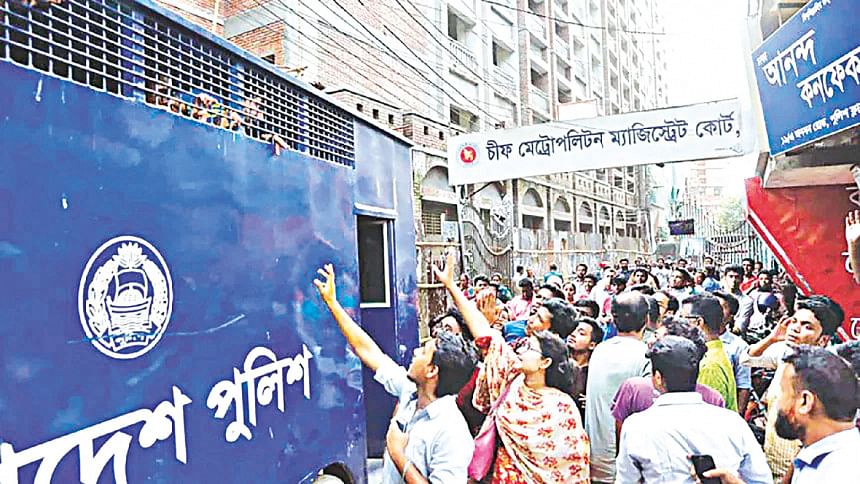Concerns over the problem of backlog of cases

Instituting a lawsuit in Bangladesh can often mean planting a magic tree that keeps growing years after years, but never comes along with flowers and fruits. This is probably very true in case of criminal litigation. With no change to the almost two centuries of British legacy in the judicial system, Bangladesh started its journey at the end of a bloody war in 1971 by declaring an array of human rights, including the right to a speedy and fair trial and the right to complete justice, as provided in articles 35 and 104 of the 1972's Constitution, respectively. As the time went by, these two rights started to fade away with an elephantine appearance of the backlog of cases. A large number of court records show the complainant died before his/her decade-long lawsuit was presented for hearing, the suspect was locked up for several years without even being tried, the eye-witnesses died or migrated beyond the reach, and the material evidences were damaged or perished due to the delay in holding trial. When the case backlog turned from bad to worse, the justice system began to be frustrated.
In 2003, the political actors, after encountering a huge backlash, modified the country's Code of Civil Procedure, 1908, by adding a mandatory window of Alternative Dispute Resolution (ADR): aiming to reduce the problem of case backlog. By contrast, it increased exponentially, with around four million cases pending as of today. It may take half a century to dispose of this mountain of cases, along with other case backlogs in the years to come.
Nearly every procedural piece of law, either conventional or special, is enacted with a specific period for disposing of the cases filed under it. For example, section 10 of the Speedy Trial Tribunal Act, 2002 mandates the court to dispose of its every case within 135 working days in total; otherwise, it shall transfer the case back where it was sent from, after writing a note of reasons for the failure to the Supreme Court of Bangladesh.
Moreover, section 17 of the Money Loan Court Act, 2003 binds the presiding judge to dispose of every suit in not more than 120 working days, but the actual picture is alarming as more than a decade-long suits are now pending in the same courts. Additionally, this Act allows the litigants to have their disputes resolved through the mandatory ADR procedure, which starts with filing a written statement. The court records suggest that every one out of ten cases – and most often no case at all – are mediated on this ADR stage, which, in turn, gives the defendants an extra 90 days for delaying the payment of the government money.
In comparison, the Income Tax Ordinance, 1984, which is a major governmental tool to recover its revenues, functions quite differently, having an imperative provision, i.e., section 156. This provision puts the commissioners of appeals under a strict obligation to dispose of each appeal within 150 days from the end of the month the appeal was filed. The failure to do so would mean that the appeal shall be deemed to be allowed and the appellant shall be exempted from the government revenue. This culminates in serious and dire consequences for every commissioner of appeals who deals such cases. With this compliance clause, no income-tax appeals are found to be unheard or undisposed of by the time they have to be. The income-tax adjudicators fearing the million-dollar liability consequences, dispose of the appeals within the strict time limit.
In Aminul Islam v James Finlay & Co. 26 DLR AD 33, their lordships decided that 'if a command in a legal text is followed by an extreme consequence for non-compliance, the text is mandatory to obey'. On the other hand, the Kohinoor Chemical Co. Limited v Eastern Shippers & Traders 41 DLR 387 case declared that legal texts are directory if they are not provided with provided with consequence for non-obeying them. The reference to these cases shows that the art of crafting legal texts could play a crucial role in the effective disposal of cases. Constructing or deconstructing legal texts put by the legislature is a huge responsibility of the courts which could potentially lead the way to contribute to the reduction of backlog of cases in Bangladesh.
The Writer is an Advocate, Supreme Court of Bangladesh.

 For all latest news, follow The Daily Star's Google News channel.
For all latest news, follow The Daily Star's Google News channel. 



Comments